Primary School Teachers’ Needs for AI-Supported STEM Education
Abstract
1. Introduction
- What are teachers’ current knowledge, skills, and practices towards STEM education?
- What are teachers’ knowledge, skills, and practices regarding using artificial intelligence in STEM education?
- What are the differences between teachers’ current knowledge, skills, and practices regarding AI-supported STEM education and the knowledge, skills, and practices defined in the literature?
- What are the training needs arising from the differences between teachers’ current situation regarding AI-supported STEM education and the literature?
2. Materials and Methods
2.1. Participants
2.2. Collection of Data
2.3. Analysing the Data
3. Results and Discussion
3.1. Teachers’ Current Knowledge, Skills, and Practices Regarding STEM Education
3.1.1. Current Status of Teachers’ Knowledge, Skills, and Practices Related to Mathematics
‘Four operation skills that can be used in activities related to numbers come to my mind first. In addition, they also have problem-solving skills to solve maths problems.’ (T.14)
‘Four operation skills (addition, subtraction, multiplication, division) and problem-solving skills.’ (T.13)
‘Number and operation skills, problem-solving skills’ (T.8)
‘Problem solving, operations, reasoning, using geometric tools and materials.’ (T.9)
‘Problem solving, association, reasoning, operations with numbers and four operation skills.’ (T.19)
‘High-level skills such as problem solving, creative thinking, critical thinking, reflective thinking, and innovation.’ (T.21)
‘I think these skills can be imparted to students in science courses as well as mathematics courses.’ (T.22)
‘I think it can be taught in Turkish, science and social studies courses.’ (T.11)
‘It can be taught in science and physical education courses through game methods.’ (T.12)
‘The first thing that came to my mind was game/physical education courses.’ (T.9)
‘Science.’ (T.6)
‘Developing students reading comprehension and interpretation skills in Turkish courses is essential. In this way, they will be able to perceive and interpret the problems they encounter in mathematics courses more clearly. For example, focusing on composition writing in Turkish courses will support the development of these skills.’ (T.2)
‘For this, students must first understand what they hear and read. For this, they must first gain the habit of reading books. Then, they must be taught how to solve with examples of events and facts so that permanent learning can occur.’ (T.10)
‘For example, a physical education course can be created with shapes to teach shapes in mathematics. Students say the shapes as they pass this course, so they also learn the shapes in mathematics.’ (T.14)
‘For example, number and operation skills can be used in force calculations on a dynamometer in science courses. Again, number and operation skills can be used when calculating a map scale in social studies courses. To develop problem-solving skills, interpreting the problems they encounter in science and social courses can contribute to their problem-solving skills in mathematics.’ (T.8)
3.1.2. Teachers’ Current Status Regarding Science-Related Knowledge, Skills, and Practices
‘Discovering and getting to know their environment and nature. Knowing living and non-living things and being aware of them. Creating new things through experiments.’ (T.14)
‘The child’s ability to recognise and distinguish living and non-living things in their environment, starting with their own body, knowing the points to pay attention to for a healthy life, and applying this to life. In addition, becoming aware of the need to respect and protect all these beings.’ (T.3)
‘I can’t think of any skills other than the ability to experiment’ (T.8).
‘Knowledge of the environment. The ability to connect with all living and non-living beings on Earth with the support of environmental knowledge.’ (T.2)
‘Skills such as observation, experimentation, and creative thinking.’ (T.9)
‘These skills can be acquired in mathematics courses.’ (T.20)
‘These skills can be acquired in science and mathematics courses.’ (T.8)
‘These skills can be acquired in Turkish courses.’ (T.15)
‘These skills can be acquired in social studies courses.’ (T.13)
‘These skills can be acquired in all courses.’ (T.9)
‘These skills cannot be acquired.’ (T.17)
‘Of course, in science courses, this cannot be achieved by reading about and experimenting with a traditional textbook. Yes, knowledge is important, but to develop these skills, students must think for themselves, make an effort, and try to find solutions. Of course, the teacher should guide them in reaching the result. Again, let’s consider problem-solving and reasoning skills to experiment. Students must first observe the existing situation, think about the possibilities (reasoning) to solve it, propose solutions, and solve it. Following these steps will enable them to acquire these skills.’ (T.11)
‘Natural phenomena (weather, seasons, etc.) can be taught by reading a passage and discussing these phenomena.’ (T.19)
‘By including some sections on science topics in Turkish reading passages, students can learn science-related terms from a dictionary and then answer questions about the passage to improve their reading comprehension skills and develop knowledge and skills related to science topics.’ (T.16)
‘For example, the topic of our country can be approached in different ways with creative thinking.’ (T.12)
3.1.3. Current Status of Teachers’ Technology Skills
‘Quickly accessing the information you are looking for and being able to come up with different ideas based on that information.’ (T.12)
‘Creativity, critical thinking, observation and application.’ (T.6)
‘Information literacy, media literacy, ChatGPT usage.’ (T.2)
‘The worksheet is transferred to the computer, and students solve the questions on the smart board. Sometimes it is done on tablets. ‘(T.14)
‘Students can be given a project assignment related to treating a disease, and they can be asked to present solution proposals and, if necessary, design three-dimensional models.’ (T.11)
‘It would be better to include technology-related courses in the curriculum. However, even if these courses are included, if students are not provided with an environment where they can apply what they learn, they will not be able to achieve the desired outcomes. The information provided will remain theoretical and be forgotten over time because it is unused.’ (T.3)
‘This is very difficult, it requires a lot of thinking.’ (T.22)
3.1.4. Current Status of Teachers’ Engineering and Design Skills
‘Engineering and design is creating something that does not exist according to a specified need.’ (T.14)
‘Engineering is a technical field. It is trying to design a job or project in advance and carry it out in the highest quality and lowest cost. Designing is also an essential aspect of engineering. Engineering cannot be realised without design.’ (T.11)
‘It is the process of using the knowledge and skills we have to produce a product.’ (T.19)
‘Engineering and design skills encompass all the abilities that enable students to transform their original ideas into tangible materials creatively. These skills include many other skills. They should be considered whole because they are multidimensional and multifaceted.’ (T.21)
‘An area that integrates all fields such as technology, engineering, and mathematics.’ (T.9)
‘Students can try to create a product using waste materials in art class.’ (T.8)
‘In science classes, students can be given a problem and asked to create an invention that would make their lives easier as a solution.’ (T.4)
3.1.5. Teachers’ Current Status Regarding STEM Practices
‘A problem that children may encounter daily can be presented. Then, each discipline offers solutions to solve the problem. Finally, these solutions are combined.’ (T.11)
‘I would prepare a course for the children. Before starting the course, I would ask them to measure their heart rates. After finishing the course, I would measure their heart rates again. I would calculate the difference. Here, they use their mathematical skills. Then, we would discuss why their heart rate, circulation, and science increased. Then I would have the students design a course that would tire them less. This way, they would use all their skills at the same time.’ (T.15)
‘The current situation in our schools is not conducive to this.’ (T.24)
‘The curricula are inappropriate; they must be revised in this direction.’ (T.21)
3.2. Teachers’ Current Status Regarding STEM Education and Artificial Intelligence
‘Sometimes I use ChatGPT to prepare lesson plans or test questions for students.’ (T.21)
‘I heard from a friend that they use ChatGPT to prepare lesson plans. Since then, I have tried using it when making weekly plans. I found it very successful, so I have been using it regularly.’ (T.5)
‘It never occurred to me to use it.’ (T.21)
‘It’s unnecessary. The teaching profession will disappear this way.’ (T.2)
‘A problem related to daily life is given, and students are provided with support from artificial intelligence to solve it.’ (T.15)
‘They can be supported while solving problems, but I don’t know how to set limits on this.’ (T.5)
‘A problem is given that requires the use of all their skills, and of course, artificial intelligence can also be used, but if artificial intelligence does all the work that the students should do, the students may become lazy.’ (T.11)
3.3. Teachers’ Artificial Intelligence-Supported STEM Education Practices According to Demographic Variables
3.4. Teachers’ Current Status Regarding AI-Supported STEM Education and Differences Between This and the Literature
3.4.1. Teachers’ Current Status Regarding Science and Mathematics, and the Differences Between This and the Literature
3.4.2. Teachers’ Current State of Technology Knowledge and Skills and Differences with the Literature
3.4.3. Current Status of Teachers’ Engineering and Design Knowledge and Skills, and Differences Between the Literature
3.4.4. Teachers’ Current Status Regarding STEM Practices and Differences from the Literature
3.4.5. Teachers’ Current Status Regarding STEM Education and Artificial Intelligence Practices, and Differences Between the Literature
3.5. Teachers’ Training Needs for AI-Supported STEM Education
4. Conclusions and Recommendations
Author Contributions
Funding
Data Availability Statement
Conflicts of Interest
References
- Ayverdi, L.; Börekci, C.; Avcu, Y.E.; Girgin, D.; Özatlı, N.S.; Satmaz, İ.; Yalçınkaya Önder, E. Science teachers’ views on the development of instructional designs for STREAM approach in the context of sustainable development goals. J. Buca Fac. Educ. 2024, 62, 3005–3033. [Google Scholar] [CrossRef]
- Akçay, B. Sustainable Development Through STEM Education. In Studies on Education, Science, and Technology (Chapter 8). International Society for Technology, Education, and Science. 2024. Available online: https://www.istes.org (accessed on 20 April 2025).
- Akpan, B.; Kennedy, T.J. (Eds.) Science Education in Theory and Practice: An Introductory Guide to Learning Theory; Springer: Berlin/Heidelberg, Germany, 2025. [Google Scholar]
- Fajrina, S.; Lufri, L.; Ahda, Y. Science, technology, engineering, and mathematics (STEM) as a learning approach to improve 21st century skills. A Review. Int. J. Online Biomed. Eng. 2020, 16, 95–104. [Google Scholar] [CrossRef]
- Surahman, E. Curriculum and instructional designs on SDGs STEM learning. Inov. Kurikulum 2024, 21, 1177–1192. [Google Scholar] [CrossRef]
- Ammar, M.; Al-Thani, N.J.; Ahmad, Z. Role of pedagogical approaches in fostering innovation among K-12 students in STEM education. Soc. Sci. Humanit. Open 2024, 9, 100839. [Google Scholar] [CrossRef]
- Islam, H. Nexus of economic, social, and environmental factors on sustainable development goals: The moderating role of technological advancement and green innovation. Innov. Green Dev. 2025, 4, 100183. [Google Scholar] [CrossRef]
- Kong, S.C.; Ogata, H.; Shih, J.-L.; Biswas, G. The role of artificial intelligence in STEM education. In Proceedings of the 29th International Conference on Computers in Education. Asia-Pacific Society for Computers in Education, Chiang Rai, Thailand, 22–26 November 2021. [Google Scholar]
- Nagaraj, B.K.; Kalaivani, A.; Suraj Begum, R.; Akila, S.; Sachdev, H.K.; Senthil Kumar, N. The emerging role of artificial intelligence in STEM higher education: A critical review. Int. Res. J. Multidiscip. Technovation 2023, 5, 1–19. [Google Scholar] [CrossRef]
- Temel Eğitim Programları. Millî Eğitim Bakanlığı. 2025. Available online: http://ttd.mebnet.net/temelegitim/#1694768579004-576b0934-4d77 (accessed on 29 May 2025).
- Budak, Y. Mesleki eğitimde ihtiyaç analizi ve işlevsel eğitim programı. Gazi Üniversitesi Endüstriyel Sanatlar Eğitim Fakültesi Derg. 2009, 245, 65–75. [Google Scholar]
- Altan, İ.M. (Ed.) Dijital Etkileşimler: Sektörel Yansımaları 1; Efe Akademi Yayınları: Istanbul, Turkey, 2022. [Google Scholar]
- Hewitt, T.W. Understanding and Shaping Curriculum: What We Teach and Why; SAGE Publications: Thousand Oaks, CA, USA, 2006. [Google Scholar]
- Öztürk, E.; Şan, A.E.; Kal, R. The investigation of school administrators and teachers’ awareness of STEM education in the Turkish Republic of Northern Cyprus. Online J. New Horiz. Educ. 2022, 12, 94–100. [Google Scholar]
- Dericioğlu, S.; Öznacar, B. Case study on the applicability of STEM education approach in Northern Cyprus education system according to the opinions of school administrators. Rev. Argent. Clínica Psicológica 2020, 29, 1776–1786. [Google Scholar]
- Dericioğlu, S.; Öznacar, B. Evaluation of the STEM self-efficacy of science teachers in Northern Cyprus secondary education. Multidiscip. Rev. 2024, 6, 2023spe013. [Google Scholar] [CrossRef]
- Kim, K.; Kwon, K. Unveiling teacher identity development: A case study of AI curriculum implementation in a rural middle school computer science class. Teach. Teach. Educ. 2025, 160, 105032. [Google Scholar] [CrossRef]
- Shankar, S.K.; Pothancheri, G.; Sasi, D.; Mishra, S. Bringing Teachers in the Loop: Exploring Perspectives on Integrating Generative AI in Technology-Enhanced Learning. Int. J. Artif. Intell. Educ. 2025, 35, 155–180. [Google Scholar] [CrossRef]
- Chen, J.; He, X.; Ning, Y.; Wijaya, T.T.; Liu, J. Task/Technology Fit or Technology Attraction? The Intentions of STEM Teachers to Use AI Technologies for Teaching Innovation. Asia-Pac. Educ. Res. 2025, 1–15. [Google Scholar] [CrossRef]
- Ateş, H.; Gündüzalp, C. Proposing a conceptual model for the adoption of artificial intelligence by teachers in STEM education. Interact. Learn. Environ. 2025, 1–27. [Google Scholar] [CrossRef]
- Beege, M.; Hug, C.; Nerb, J. AI in STEM education: The relationship between teacher perceptions and ChatGPT use. Comput. Hum. Behav. Rep. 2024, 16, 100494. [Google Scholar] [CrossRef]
- Dönmez, M.C. Robotik Uygulamaların Aday Öğretmenlerin STEM Farkındalıkları, Fen Öğretmeye Yönelik öz Yeterlikleri ve STEM’e Yönelik Tutumları Üzerine Etkileri [The Effects of Robotic Activities on STEM Awarenesses, Self-Efficacy Beliefs in Science Teaching and Attitudes Towards STEM of Pre-Service Teachers]. ProQuest Dissertations & Theses. 2020. Available online: https://www.proquest.com/docview/31728832 (accessed on 29 May 2025).
- Riahi, B.; Cateté, V. Comparative Analysis of STEM and Non-STEM Teachers’ Needs for Integrating AI into Educational Environments. In Learning and Collaboration Technologies; Smith, B.K., Borge, M., Eds.; HCII 2025; Lecture Notes in Computer Science; Springer: Cham, Switzerland, 2025; Volume 15807. [Google Scholar] [CrossRef]
- Tam, P.Y.; Ali, M.; Wong, G.K.W. Exploring primary school teachers’ perspectives in integrating AI into STEM education through modular STEM activities. In Proceedings of the 9th International Conference on Computational Thinking and STEM Education (CTE-STEM 2025), Hong Kong, China, 18–20 June 2025. [Google Scholar]
- Jackson, R.L.; Drummond, D.K.; Camara, S. What is qualitative research? Qual. Res. Rep. Commun. 2007, 8, 21–28. [Google Scholar] [CrossRef]
- Çapar, M.; Ceylan, M. Durum çalışması ve olgubilim desenlerinin karşılaştırılması. Anadolu Üniversitesi Sos. Bilim. Derg. 2022, 22, 295–312. [Google Scholar] [CrossRef]
- Bozpolat, E.; Topdağı, M. İlkokulda temel algoritma ve kodlama eğitimine yönelik bir ihtiyaç analizi. MANAS Sos. Araştırmalar Derg. 2022, 11, 933–957. [Google Scholar] [CrossRef]
- Türkmenoğlu, M.; Baştuğ, M. İlkokulda akran öğretimi aracılığıyla okuma güçlüğünün giderilmesi. Eğitimde Nitel Araştırmalar Derg. 2017, 5, 36–66. [Google Scholar]
- Squires, V. Varieties of qualitative research methods: Selected contextual perspectives. In Thematic Analysis; Springer: Berlin/Heidelberg, Germany, 2023; pp. 463–468. [Google Scholar]
- Braun, V.; Clarke, V. Psikolojide tematik analizin kullanımı. J. Qual. Res. Educ. 2019, 7, 873–898. [Google Scholar] [CrossRef]
- Seah, W.T.; Kim, H.; Kim, D.-J. Reimagining mathematics education for the 21st century in the 21st century. J. Educ. Res. Math. 2021, 31, 393–404. [Google Scholar] [CrossRef]
- Verdi, E.; Balım, A.G. STEM pedagojik alan bilgisi (STEMPAB) üzerine yapılan çalışmaların incelenmesi. Mehmet Akif Ersoy Üniversitesi Eğitim Fakültesi Derg. 2023, 68, 351–375. [Google Scholar] [CrossRef]
- Correia, M.; Baptista, M. Supporting the development of pre-service primary teachers’ PCK and CK through a STEM program. Educ. Sci. 2022, 12, 258. [Google Scholar] [CrossRef]
- Whitney-Smith, R.; Day, L.; Hurrell, D. The role of mathematics education in developing students’ 21st-century skills, competencies and STEM capabilities. In Proceedings of the 44th Annual Conference of the Mathematics Education Research Group of Australasia, Launceston, Australia, 3–7 July 2022; Mathematical Confluences and Journeys. Fitzallen, N., Murphy, C., Hatisaru, V., Maher, N., Eds.; MERGA: Launceston, Australia, 2022; pp. 554–561. [Google Scholar]
- Acar, D. Öğretmenlerin Problem Çözme Becerilerinin ve Davranışlarının Yaratıcı Düşünmenin Gelişimine Katkısının Yordanmasında STEM Farkındalıklarının Rolü. Acad. Eğitim Araştırmaları Derg. 2020, 5, 77–89. [Google Scholar]
- Goos, M.; Carreira, S.; Namukasa, I.K. Mathematics and interdisciplinary STEM education: Recent developments and future directions. ZDM Math. Educ. 2023, 55, 1199–1217. [Google Scholar] [CrossRef]
- Just, J.; Siller, H.-S. The role of mathematics in STEM secondary classrooms: A systematic literature review. Educ. Sci. 2022, 12, 629. [Google Scholar] [CrossRef]
- Broderick, N. Exploring different visions of scientific literacy in Irish primary science education: Core issues and future directions. Ir. Educ. Stud. 2023, 42, 73–93. [Google Scholar] [CrossRef]
- Bilir, U. Türkiye’de 2018 ve 2024 yılları fen bilimleri dersi öğretim programlarının temel öğeler açısından karşılaştırılması. Millî Eğitim 2025, 54, 793–836. [Google Scholar] [CrossRef]
- Değirmenci, S. STEM eğitimi Almış öğretmenlerin STEM öz Yeterliliklerinin ve Uygulamalarında teknoloji ve Mühendislik Entegrasyonu Açısından Yaşadıkları Sorunların Belirlenmesi (Yüksek Lisans Tezi). Marmara Üniversitesi, Eğitim Bilimleri Enstitüsü, Bilgisayar ve Öğretim Teknolojileri Eğitimi Ana Bilim Dalı, Bilgisayar ve Öğretim Teknolojileri Öğretmenliği Programı. Master’s Thesis, Marmara Üniversitesi, Istanbul, Turkey, 2020. [Google Scholar]
- Johler, M.; Krumsvik, R.J. Increasing inclusion through differentiated instruction in a technology-rich primary school classroom in Norway. Education 2022, 52, 1207–1221. [Google Scholar] [CrossRef]
- Hıdıroğlu, Ç.N.; Karakaş, A. Transdisciplinary role of technology in STEM education. Malays. Online J. Educ. Technol. 2022, 10, 276–293. [Google Scholar] [CrossRef]
- Christian, K.B.; Kelly, A.M.; Bugallo, M.F. NGSS-based teacher professional development to implement engineering practices in STEM instruction. Int. J. STEM Educ. 2021, 8, 21. [Google Scholar] [CrossRef]
- Karaduman, B.; Eti, İ. STEM for all: Opinions of education staff at a STEM education center on STEM education. Trak. J. Educ. 2023, 13, 209–225. [Google Scholar] [CrossRef]
- Güleç Çiftçi, D.; Şentürk, C. Okul Yöneticilerinin STEM Eğitimine Yönelik Görüşlerinin İncelenmesi. Elektron. Eğitim Bilim. Derg. 2024, 13, 121–155. [Google Scholar] [CrossRef]
- Seyrek, M.; Yıldız, S.; Emeksiz, H.; Şahin, A.; Türkmen, M.T. Öğretmenlerin eğitimde yapay zeka kullanımına yönelik algıları [Teachers’ perceptions of the use of artificial intelligence in education]. Int. J. Soc. Humanit. Sci. Res. 2024, 11, 845–856. [Google Scholar] [CrossRef]
- Keskin, D.; Sevil, O. Eğitimde yapay zekâ ve etik. In Proceedings of the International Topkapı Congress 3, Istanbul, Turkey, 1–2 May 2024. [Google Scholar]
- Al Darayseh, A.; Mersin, N. Integrating generative AI into STEM education: Insights from science and mathematics teachers. Int. Electron. J. Math. Educ. 2025, 20, 16232. [Google Scholar] [CrossRef]
- Başaran, M. Okul Öncesi Eğitimde Stem Yaklaşımının Kullanılabilirliği (Eylem Araştırması); Gaziantep Üniversitesi, Eğitim Bilimleri Enstitüsü, Eğitim Bilimleri Ana Bilim Dalı: Gaziantep, Turkey, 2018. [Google Scholar]
- Hague, C.; Payton, S. Digital Literacy Across the Curriculum; Futurelab: Tokyo, Japan, 2011. [Google Scholar]
- Voogt, J.; Roblin, N.P. A comparative analysis of international frameworks for 21st-century competencies: Implications for national curriculum policies. J. Curric. Stud. 2012, 44, 299–321. [Google Scholar] [CrossRef]
- Çevik, M.; Azkın, Z. STEM anlayışının ve görselleştirilmesinin zeka alanlarıyla ilişkisinde proje tabanlı öğretime dayanan stem yaklaşımının (STEM PTÖ) rölü. Akdeniz Eğitim Araştırmaları Derg. 2020, 14, 1–44. [Google Scholar] [CrossRef]
- Öteleş, Ü. Sosyal Bilgiler Dersinde Proje Tabanlı Öğrenmenin Öğrencilerin Akademik Başarısına, Derse Karşı Tutumuna Ve Sınıf Ortamına İlişkin Demokratik Tutumuna Etkisi. Ph.D. Thesis, Fırat Üniversitesi, Elaze, Turkey, 2019. [Google Scholar]
- Wang, H.; Moore, T.J.; Roehrig, G.H.; Park, M.S. Stem integration: Teacher perceptions and practice. J. Pre-Coll. Eng. Educ. Res. 2011, 1, 2. [Google Scholar] [CrossRef]
- Lo, C.K. Design principles for effective teacher professional development in integrated STEM education. Educ. Technol. Soc. 2021, 24, 136–152. [Google Scholar]
- Köse, M.; Ataş, R. Sınıf öğretmenlerinin STEM eğitimine yönelik görüşlerinin değerlendirilmesi. Acad. J. Educ. Sci. 2020, 4, 103–110. [Google Scholar] [CrossRef]
- Valeri, F.; Nilsson, P.; Cederqvist, A. Exploring students’ experience of ChatGPT in STEM education. Comput. Educ. Artif. Intell. 2025, 8, 100360. [Google Scholar] [CrossRef]
- Triplett, W.J. Artificial intelligence in STEM education. Cybersecur. Innov. Technol. J. 2023, 1, 23–29. [Google Scholar] [CrossRef]
- Gencer, A.S.; Doğan, H.; Bilen, K.; Can, B. Integrated STEM education models. PAU J. Educ. 2019, 45, 38–55. [Google Scholar] [CrossRef]
- Roberts, A.; Cantu, D. Applying STEM Instructional Strategies to Design and Technology Curriculum. In Proceedings of the PATT 26 conference Stockholm, Stockholm, Sweden, 26–30 June 2012. [Google Scholar]
- Parlak, N.; Yurdakul, F.; Kalender, M.; Üngör, B. Dijital dönüşüm ve eğitim: Öğretmenlerin karşılaştığı yenilikçi yaklaşımlar. Ulus. Eğitim Derg. 2023, 3, 1322–1339. Available online: http://www.uleder.com/index.php/uleder/article/view/311 (accessed on 20 April 2025).
- Ülçay, O. Türkiye Yüzyılı Maarif Modeli Değerlendirmesi. Ulus. Eğitim Toplum Ve Dünya Derg. 2024, 1, 70–75. [Google Scholar]
- Amdan, M.A.B.; Janius, N.; Kasdiah, M.A.H.B. Efficiency of artificial intelligence (AI) tools for STEM education in Malaysia. Int. J. Sci. Res. Arch. 2024, 12, 553–559. [Google Scholar] [CrossRef]
- Xu, W.; Ouyang, J. The application of AI technologies in STEM education: A systematic review from 2011 to 2021. Int. J. STEM Educ. 2022, 9, 59. [Google Scholar] [CrossRef]
- Sakulkueakulsuk, B.; Witoon, S.; Ngarmkajornwiwat, P.; Pataranutaporn, P.; Surareungchai, W.; Subsoontorn, P. Kids making AI: Integrating Machine Learning, Gamification, and Social Context in STEM Education. In Proceedings of the 2018 IEEE International Conference on Teaching, Assessment, and Learning for Engineering (TALE), Wollongong, NSW, Australia, 4–7 December 2018; pp. 1005–1010. [Google Scholar] [CrossRef]
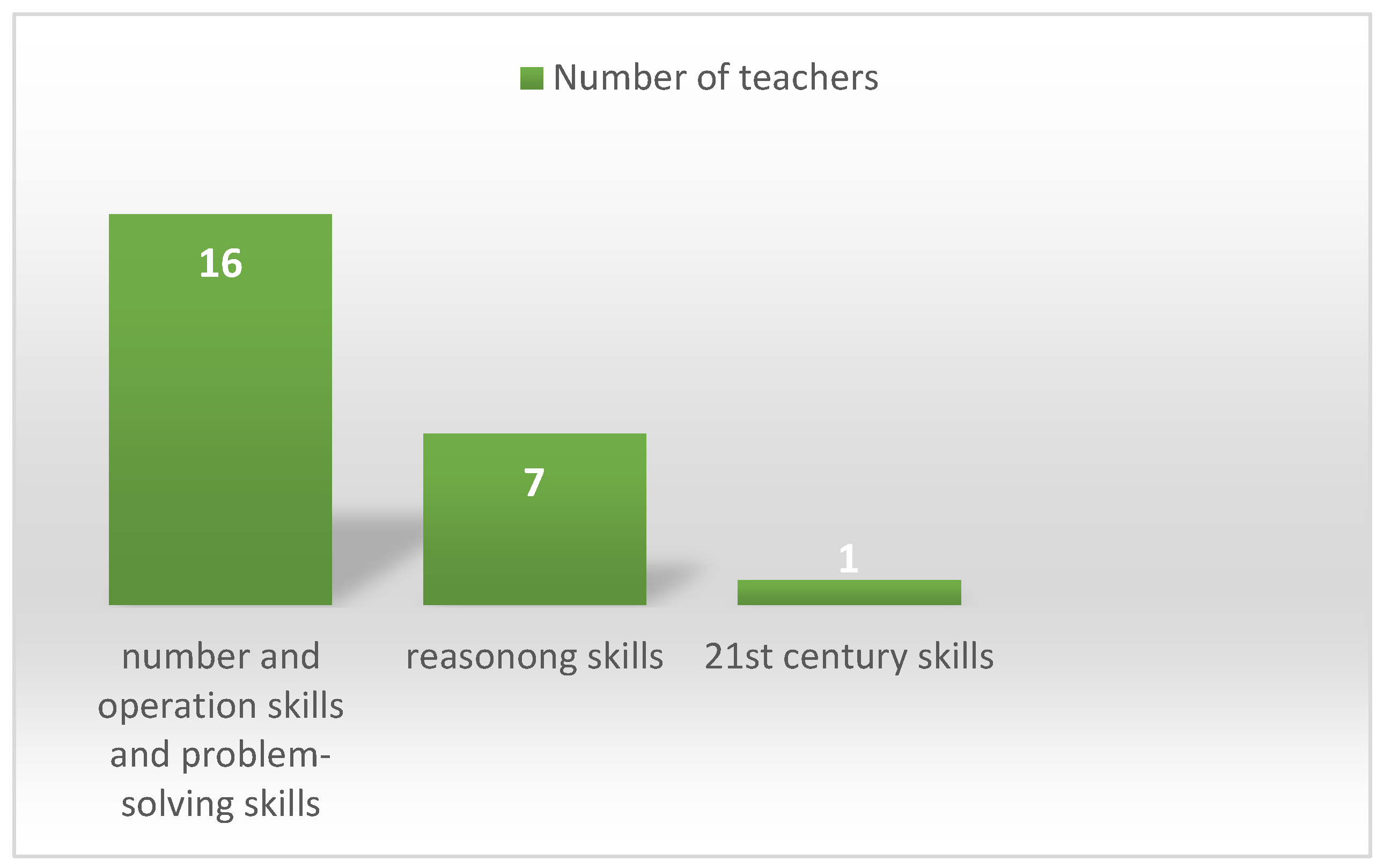
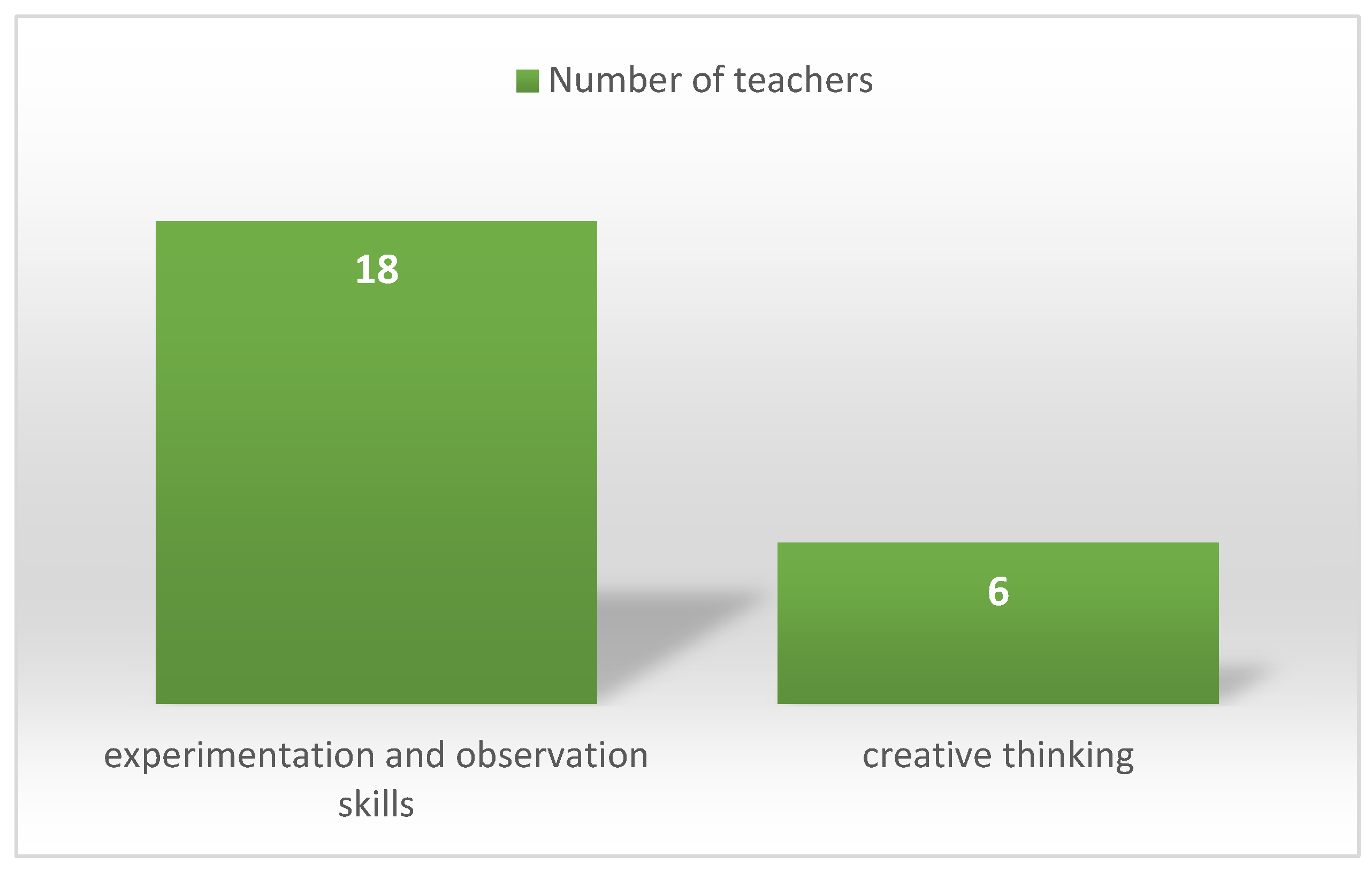
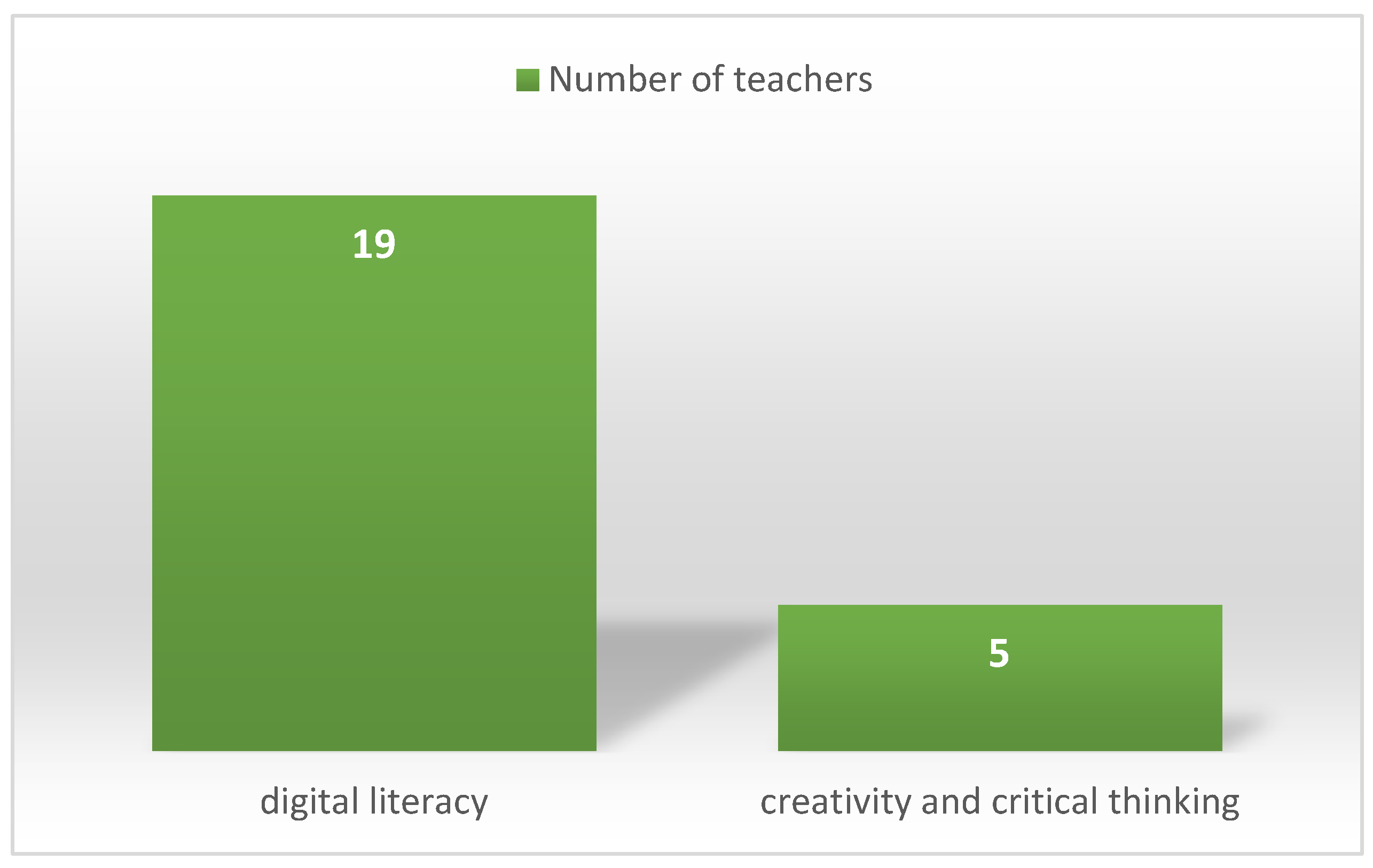


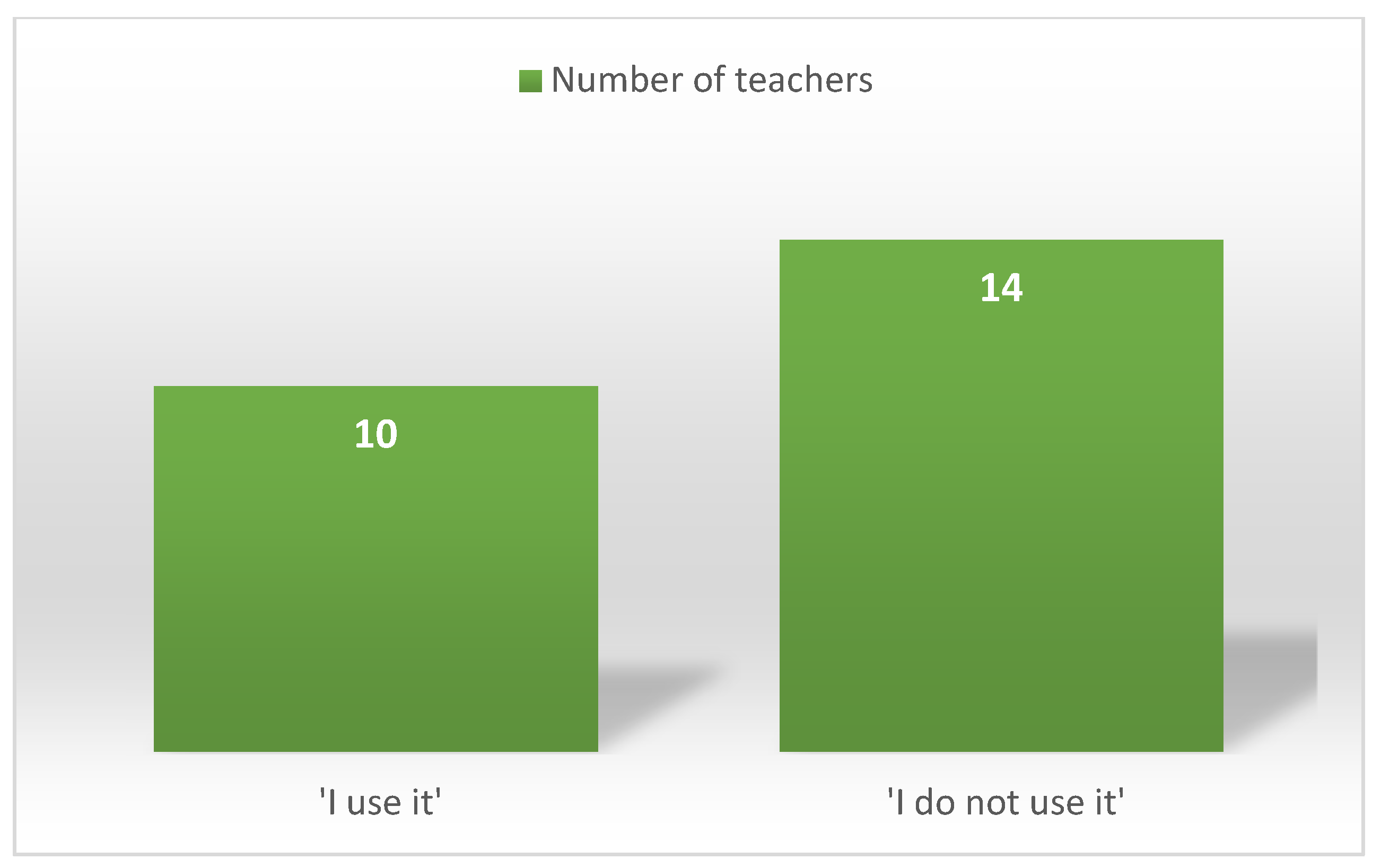
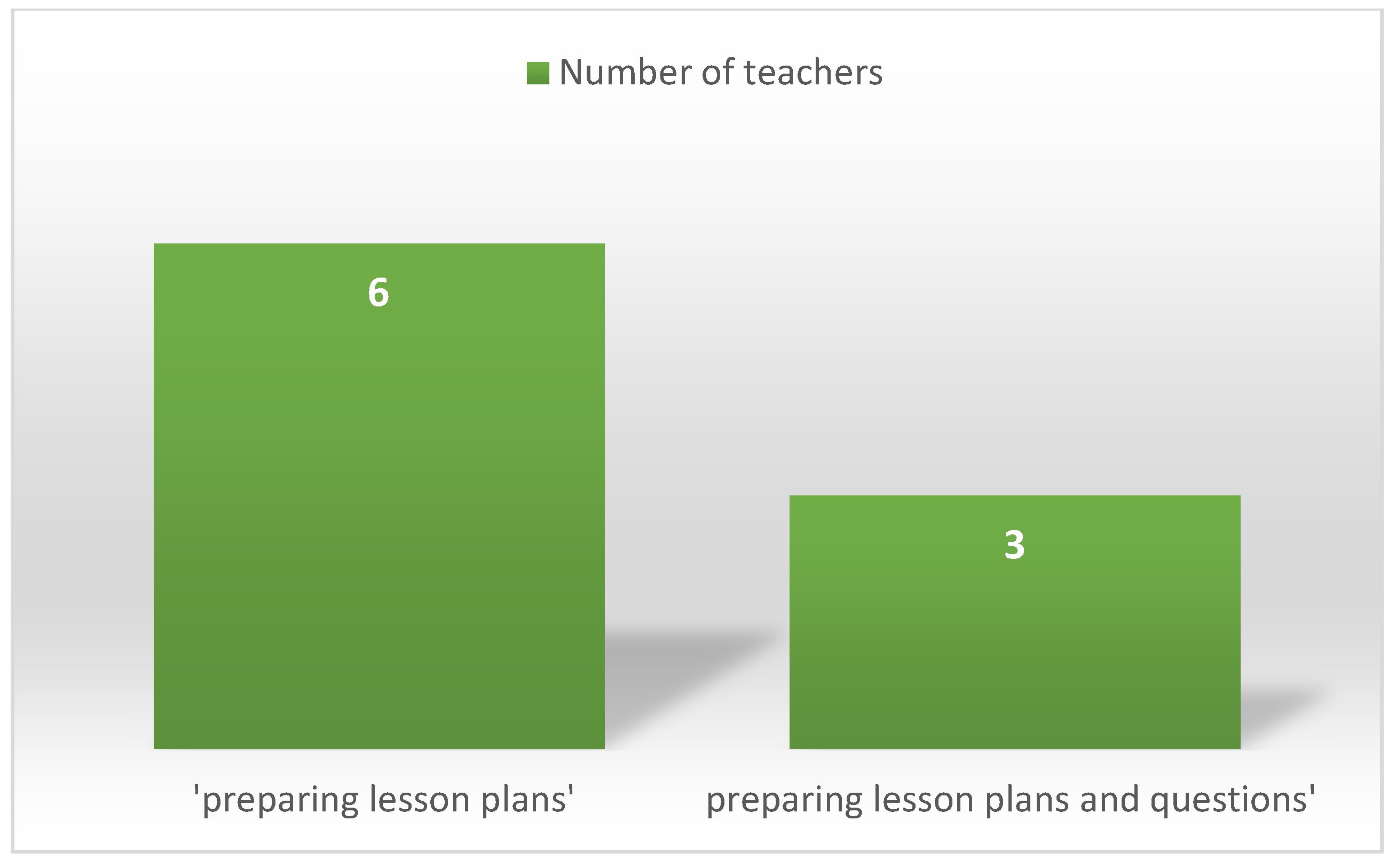
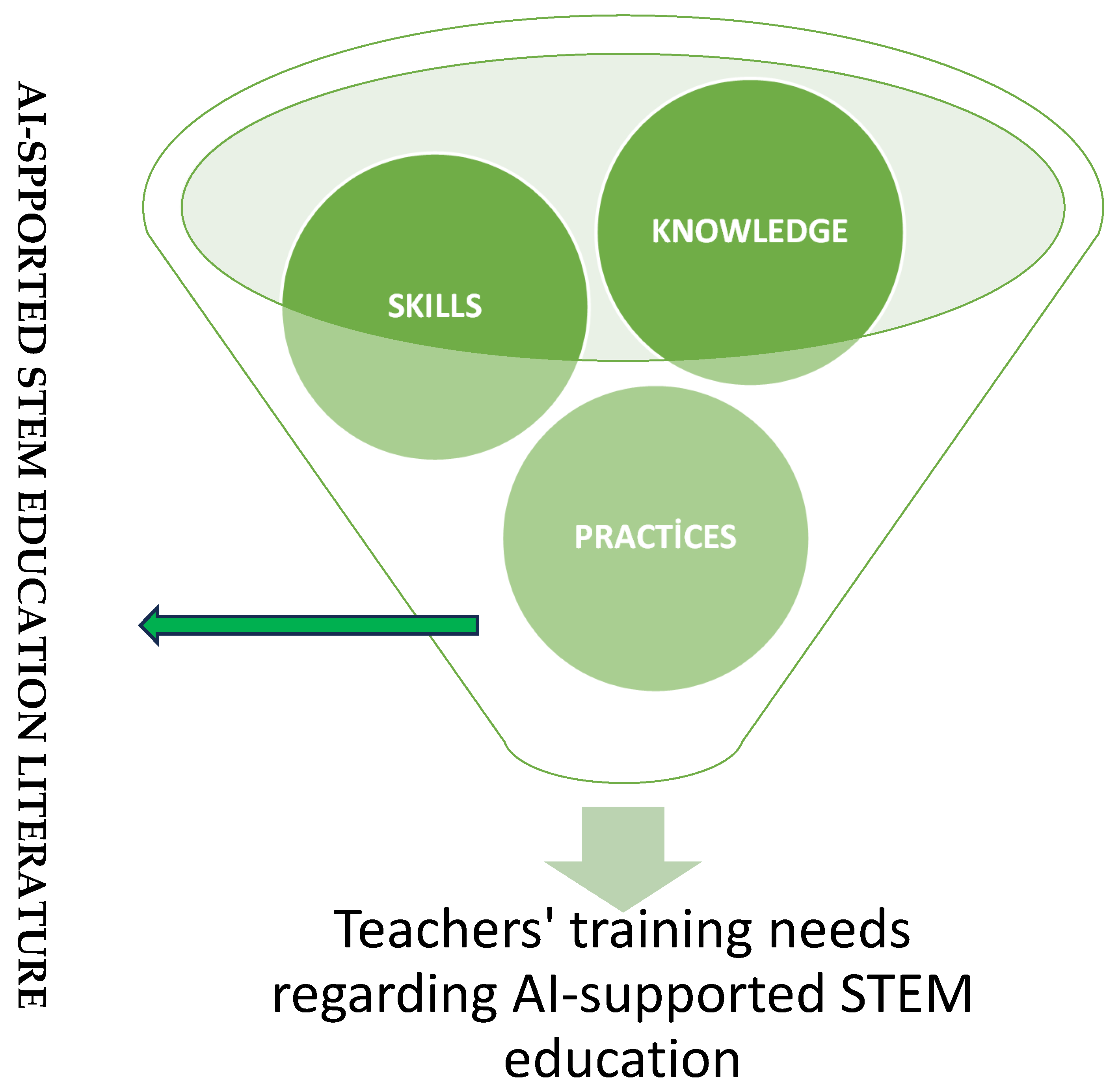
Disclaimer/Publisher’s Note: The statements, opinions and data contained in all publications are solely those of the individual author(s) and contributor(s) and not of MDPI and/or the editor(s). MDPI and/or the editor(s) disclaim responsibility for any injury to people or property resulting from any ideas, methods, instructions or products referred to in the content. |
© 2025 by the authors. Licensee MDPI, Basel, Switzerland. This article is an open access article distributed under the terms and conditions of the Creative Commons Attribution (CC BY) license (https://creativecommons.org/licenses/by/4.0/).
Share and Cite
Bas, C.; Kiraz, A. Primary School Teachers’ Needs for AI-Supported STEM Education. Sustainability 2025, 17, 7044. https://doi.org/10.3390/su17157044
Bas C, Kiraz A. Primary School Teachers’ Needs for AI-Supported STEM Education. Sustainability. 2025; 17(15):7044. https://doi.org/10.3390/su17157044
Chicago/Turabian StyleBas, Cizem, and Askin Kiraz. 2025. "Primary School Teachers’ Needs for AI-Supported STEM Education" Sustainability 17, no. 15: 7044. https://doi.org/10.3390/su17157044
APA StyleBas, C., & Kiraz, A. (2025). Primary School Teachers’ Needs for AI-Supported STEM Education. Sustainability, 17(15), 7044. https://doi.org/10.3390/su17157044






